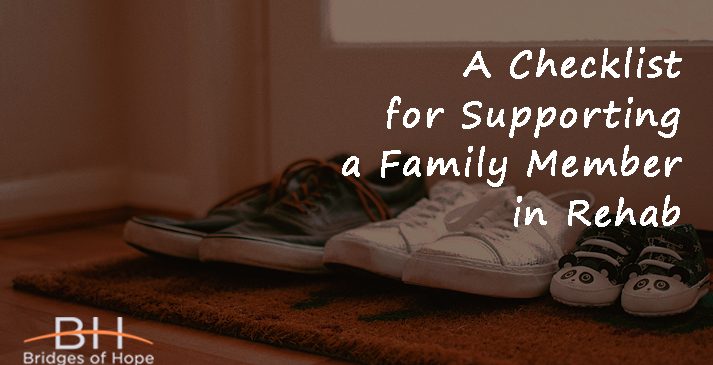When you have a loved one or family member in rehab, it’s easy to feel helpless and disconcerted. It can also be overwhelming at times too.
Out of your concern and love for them, you want to support them and somehow make their journey easier. However, you yourself feel lost and uncertain.
To help you help your family member in rehab, here are some tips to get you started.
Supporting a Family Member in Rehab
In order to understand a person’s substance use disorder, you have to also see it in the context of an individual’s family. Addiction is a complicated disease that develops overtime. There is no definite rule to say how a person develops it, but family plays a part.
In the same way, family members also play an important role in an individual’s journey from addiction towards recovery. This is why at Bridges of Hope, we make it a point to closely work with the family to understand our residents. We also make sure that the family is involved throughout their family members’ treatment.
This way, anyone within the family can also participate in the process. It also provides healing not just for the resident, but for the family too.

A Checklist for Supporting a Family Member in Rehab
If you have a family member in rehab, it’s important to understand the right steps to take in order to support them. As their family member you make also know patterns and behaviors within your family and relationships that may have contributed to the addiction. The family dynamics may hold clues in helping the resident.
This said, everyone in the family should also work together to create a positive, supportive environment not just for the resident when he completes his treatment, but also for everyone.
- Be involved in the treatment. Sending a family member into a rehab like Bridges of Hope isn’t enough. You have to also be involved in their care and treatment. Our counselors and program staff will be in close contact with you throughout the resident’s treatment program, and you can provide helpful input and insights to help make the treatment more effective.
- Lean and be aware. It’s also important to know the kind of addiction or disorder that your loved one has. Our program staff will be happy to orient you and provide addiction education to make your knowledge about addiction and illicit substances deeper. This will also make you understand that addiction is a brain disease, and therefore, help put things in better perspective.
- Work on your own mental health. You may have developed your own habits and negative coping mechanisms Working on your own mental health can also help improve the family dynamics and improve relationships. This will help you change negative behavior that make your family a conducive venue for recovery.
- Be prepared to make changes. Prepare your loved one in the rehab by making changes and adjustments at home. One important thing to consider is removing objects or associations that may trigger your loved one once he gets back from treatment. You have to be willing to make changes in order to prioritize your loved one’s recovery.
- Encourage support systems. You alone can’t be their support system for so long. Having peers who have gone through the same things they did can also help them especially after they finished their treatment program.
- Encourage routines. Coming out of a rehab center and back into the “real world” this time without the crutch called addiction, things will be so much different for your family member. You can help them navigate this new journey by encouraging activities and routines. In Bridges of Hope, residents have a structured environment and schedule, extending something like this in your home can help make the transition smoother.
- Set boundaries. This time around, you can set and impose boundaries for yourself and your family member who is in recovery. You may coordinate with their counselor or program director to help you with this. Practical, healthy boundaries and setting expectations can also help you both in this new stage of your journey as a family.
- Prepare a plan. This is still a tumultuous time for your family member in rehab, so be prepared for the worst. You can’t expect things to be smooth-sailing now that they are in rehab, as things can still be a struggle. Know what you can do to help them in their journey in cases when things become especially difficult.
Remember, addiction is a family disease. Even if only one is using, the whole family is affected. This is why it’s important to work together and find healing and recovery together.


[…] a family member of someone who came home from rehab after years of active addiction and many broken or damaged […]
[…] you are worried about your family member’s substance addiction, especially if you’re a parent, sibling, or guardian of young adults, then it’s […]